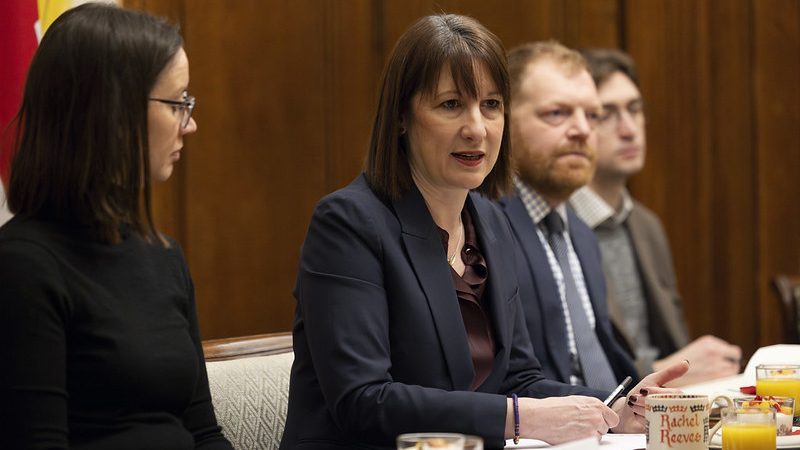
Critics have been too eager to dismiss the Chancellor’s decision to change the government’s debt measure but this brave choice is a move with growth at its heart.
The new measure, Public Sector Net Financial Liabilities (PSNFL), allows the government to take a much more rounded view of the assets it holds, limiting the perverse incentives that previous fiscal rules have created. In turn, this will catalyse the private sector investment needed to drive growth.
READ MORE: ‘Rachel Reeves faces a similar challenge to Labour’s Iron Chancellor in 1931’
If we want our country to invest in its future, this will require up-front borrowing costs but borrowing to invest in growing health, transport and energy will ultimately drive up living standards across the country.
The fiscal rule change has also been coupled with a new Pensions Bill, aimed at consolidating small funds so that we can unlock far greater investment in the country’s future.
Taken together, this future-facing fiscal programme is in stark contrast to the austerity years which both starved our public services of funds and failed to invest in our future.
This has left the new government with the lowest investment of any G7 country- a systemic problem in the UK economy that will take time to redress.
It is clear that the bond markets see a country with both high debt and low growth but this underprices quite how significant the cumulative effects of the government’s supply side reforms are.
Given the dire economic inheritance and the context of deep international instability, it is time for progressives to reclaim supply side reform as the key route to boost productive capacity of the economy and thereby raise living standards and reduce inequality.
One key example of this is the government’s plans for planning reform, overseen by Angela Rayner. The changes to the National Planning Policy Framework (NPPF) will not only provide opportunities for people in my generation to own their own home, but also turbocharge economic growth.
This is yet another brave choice the government has made, contrasting with the Sunak Government’s decision to scrap mandatory house targets in the face of opposition from his backbenchers.
READ MORE: ‘LabourList readers say PM should back Reeves – but not for whole parliament’
Likewise, Angela Rayner’s department has also been driving through a programme of devolution, empowering the English regions to have a far greater say over their future.
The change that devolution makes is not a hypothetical. A study by The Lancet found that devolution that residents in Greater Manchester had “better life expectancy than expected after devolution.” Our country’s economic growth must be driven by the growth of major cities like Manchester and by embracing English devolution, the Government has set in place the path to just that.
But on supply side reform, that’s not all. They have already legislated to enhance workers’ rights boosting security at work. The new National Wealth Fund is going to help growth the jobs of the future of our energy supply, including in nuclear. Their transport plans are empowering local leaders to re-franchise buses and giving far more coherence on the railways through Great British Rail.
They are working to fix the holes in the Brexit deal to boost growth through new security and veterinary deals. And their radical skills programme, including creating in Skills England, is going to invest in the people that deliver our growth.
Moreover, this week’s announcement on vastly increasing the use of Artificial Intelligence is a key growth policy too. Throughout history, rapid technological advancement has brought the creative disruption needed to grow the economy. AI affords us the chance to do just that, using data to revolutionise health prevention, personalise education and crack-down on Serious Organised Crime.
Clearly, this will all take time. But when seen together, the sheer cumulative effect of the Government’s deep supply side reforms will be enormous for boosting growth, raising living standards and reducing inequality.
For more from LabourList, follow us on Bluesky, Threads, X, Facebook, Instagram or WhatsApp.
SIGN UP: Get the best daily roundup and analysis of Labour news and comment in our newsletter
- SHARE: If you have anything to share that we should be looking into or publishing about this story – or any other topic involving Labour– contact us (strictly anonymously if you wish) at [email protected].
- SUBSCRIBE: Sign up to LabourList’s morning email here for the best briefing on everything Labour, every weekday morning.
- DONATE: If you value our work, please donate to become one of our supporters here and help sustain and expand our coverage.
- PARTNER: If you or your organisation might be interested in partnering with us on sponsored events or content, email [email protected].




More from LabourList
‘Tackling poverty should be the legacy of Keir Starmer’s government’
‘The High Court judgment brings more uncertainty for the trans community’
‘There are good and bad businesses. Labour needs to be able to explain the difference’